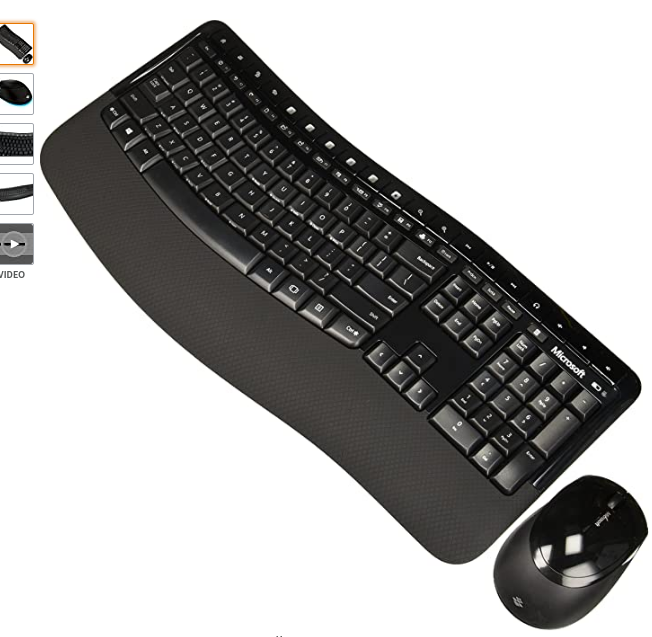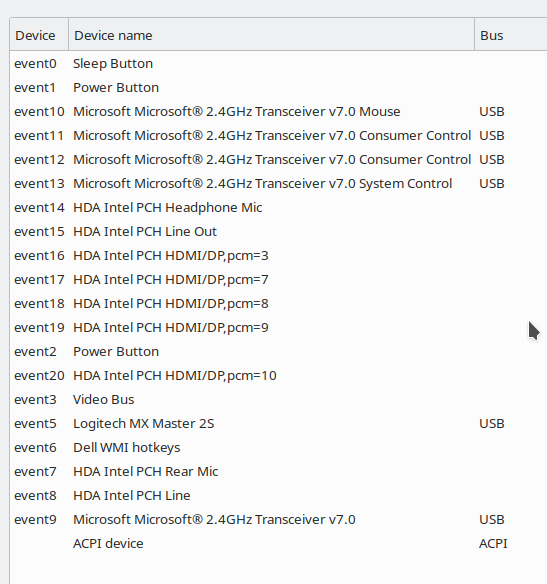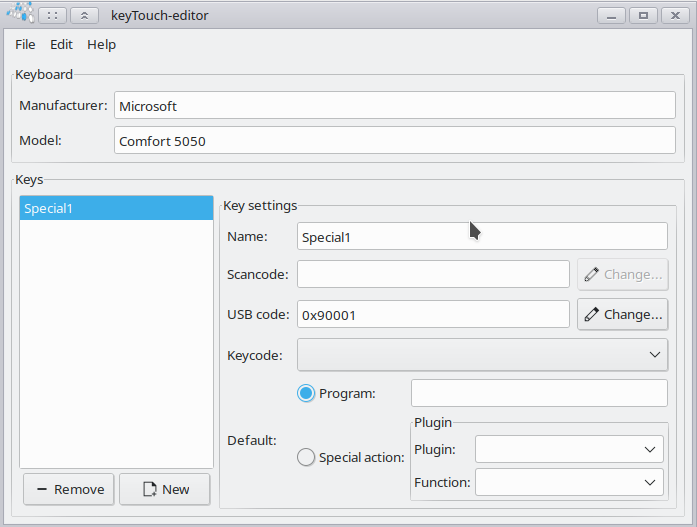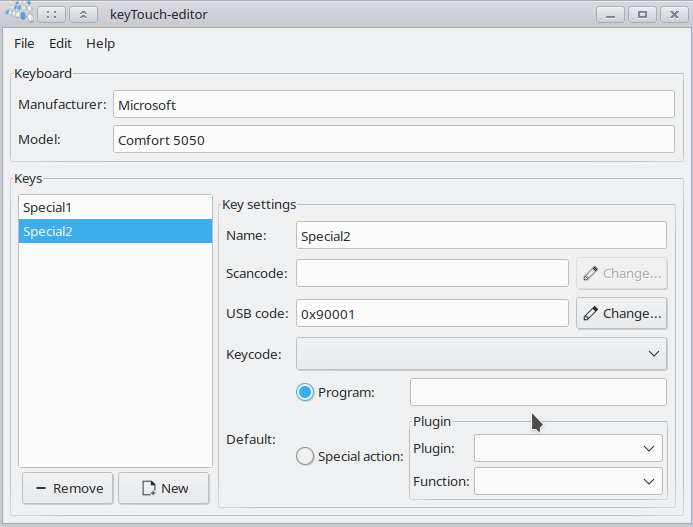I'm having a rough time getting all the keys on my new Microsoft Comfort 5050 Desktop keyboard to work. It's this keyboard:

Almost everything works. All the regular keys work out of the box. Other keys I've been able to get to work with this standard route:
System Settings ==> Shortcuts ==> Custom Shortcuts ==> [right click "examples"] ==> New ==> Command/URL
For example, I did that and put in the kcalc command and pressed the button that looks like a little calculator on the keyboard. Now that brings up the calculator. No problem. It also worked for the button that looks like an envelope. I assigned that one to go to the URL where I get my Yahoo mail.
So far, so good. It has all been working exactly like my previous Microsoft keyboard, a 4000, which I'm replacing due to age.
However, the ones I haven't been able to make work are the specialty buttons numbered 1 - 5. These should not be confused for the number keys or for the function keys (F1 - F5). Most Microsoft keyboards have these speciality hot keys numbered 1 - 5. Right next to them is a star key, which is commonly used to pull up a directory for the 1 - 5 hotkeys.
This star button I was actually able to assign to something. I assigned that to my KeepassXC application. When I pressed on it to assign it, it was named "favorites". When I named kcalc by pressing on the calculator button, it was named "launch(1)".
But naming those 1 - 5 specialty buttons has been like pulling teeth. They don't respond when I press them to assign them. On the old MS keyboard, the 4000, they would always be named "launch" and a number, much like the calculator button did. But they don't respond.
There is a place in settings where you can specify a specific keyboard. That's in:
System Settings ==> Input Devices ==> Keyboard
I've tried setting it to every Microsoft keyboard on the list, but it doesn't seem to make any difference. I can assign any key other than the specialty 1 - 5 keys. I even tried setting it to a few Dell keyboards (this PC is a Dell), but there was no difference.
I've googled this a ton, and I happened upon a utility that's supposed to solve the problem. It's named keytouch-editor, and its web page is here:
http://keytouch.sourceforge.net/dl-keytouch-editor.php
I installed it from the Discover repository, and it ran in the sense of it pulled up a GUI, but I could not get it to assign those keys. I uninstalled that one and then installed the deb file that's supposed to be for the 3.1.2 Ubuntu package AMD64. I couldn't get that one to run. I installed it, but I get the error message:
"No event devices are available in /dev/input."
Super frustrating.
However, if I run the Krusader file manager as root and then go into the usr/sbin directory and double click on keytouch-editor, it runs. Strange.
So this little utility brings up a menu like this:

It has me choose these keyboards one by one and test the specialty key to see if it responds. None of them respond except for the Logitech MX Master 2S. Weird.
Anyway, it has me assign each keystroke with menus like these:


You'll notice that each special key has the same USB code. I did all 5 of them, and they all had that same code. Then when I went to save the set, it brought up this error:

It makes me wonder if I've even got the right utility. I also noticed on that guy's web page, he has some ready made Microsoft keyboard files here:
http://keytouch.sourceforge.net/keyboards_microsoft.php
That's great, but I don't even know what to do with these files. How can I try them out to see if they might work for my keyboard? If I open a file, I see that it has code like this:
Is there some way I could plug one of these into Kubuntu to see if it work for my keyboard. Frankly, I'm surprised that the special keys 1 through 5 aren't working. This keyboard is fundamentally the same design as my old keyboard, the 4000. One difference is the old one is not wireless. I did use my generic Dell keyboard between these two -- not sure if that makes a difference.
I noticed that my version of keytouch-editor was not the latest, so I downloaded the latest deb file for Ubuntu from here:
http://keytouch.sourceforge.net/dl-keytouch.php
When I tried to install it via QApt package installer, it complained about not having all dependencies satisfied, so I tried on the command line. It still bitched, but at least it told me what was missing. It was this thing called libgnome-menu2. So I searched how to install it and found this page:
https://zoomadmin.com/HowToInstall/U...libgnome-menu2
It gave me these steps to install that:
So I did that, but it failed. My God! What do I have to do to get this @#$%ing thing to work?
So I try downloading the very latest platform independent one:
keyTouch 2.4.1 -- source
From same page (http://keytouch.sourceforge.net/dl-keytouch.php).
I put that in a directory and extract it and find an install instructions file, which say:
- Run './configure' in this directory.
- Run 'make'
- Run 'make install' as root
I try that. It doesn't work.
AAAAAARRRRRRRGGGGGGGGGGG!
Granted, I don't know very much about compiling source and then installing. But, sheesh, what do I have to do to make these specialty hotkeys work? They worked so well on the previous Microsoft keyboard. I don't even know for sure if this keytouch-editor program is even the answer. But I can't even get its latest version to run to find out.
I've googled and tried stuff till my brain is fried. I don't even know how to test those ready-made files (http://keytouch.sourceforge.net/keyboards_microsoft.php) to see if they can help.
I've tried what I know how to do and am stuck. If anyone has any ideas on what might make those buttons work, I'd be delighted to hear from you.

Almost everything works. All the regular keys work out of the box. Other keys I've been able to get to work with this standard route:
System Settings ==> Shortcuts ==> Custom Shortcuts ==> [right click "examples"] ==> New ==> Command/URL
For example, I did that and put in the kcalc command and pressed the button that looks like a little calculator on the keyboard. Now that brings up the calculator. No problem. It also worked for the button that looks like an envelope. I assigned that one to go to the URL where I get my Yahoo mail.
So far, so good. It has all been working exactly like my previous Microsoft keyboard, a 4000, which I'm replacing due to age.
However, the ones I haven't been able to make work are the specialty buttons numbered 1 - 5. These should not be confused for the number keys or for the function keys (F1 - F5). Most Microsoft keyboards have these speciality hot keys numbered 1 - 5. Right next to them is a star key, which is commonly used to pull up a directory for the 1 - 5 hotkeys.
This star button I was actually able to assign to something. I assigned that to my KeepassXC application. When I pressed on it to assign it, it was named "favorites". When I named kcalc by pressing on the calculator button, it was named "launch(1)".
But naming those 1 - 5 specialty buttons has been like pulling teeth. They don't respond when I press them to assign them. On the old MS keyboard, the 4000, they would always be named "launch" and a number, much like the calculator button did. But they don't respond.
There is a place in settings where you can specify a specific keyboard. That's in:
System Settings ==> Input Devices ==> Keyboard
I've tried setting it to every Microsoft keyboard on the list, but it doesn't seem to make any difference. I can assign any key other than the specialty 1 - 5 keys. I even tried setting it to a few Dell keyboards (this PC is a Dell), but there was no difference.
I've googled this a ton, and I happened upon a utility that's supposed to solve the problem. It's named keytouch-editor, and its web page is here:
http://keytouch.sourceforge.net/dl-keytouch-editor.php
I installed it from the Discover repository, and it ran in the sense of it pulled up a GUI, but I could not get it to assign those keys. I uninstalled that one and then installed the deb file that's supposed to be for the 3.1.2 Ubuntu package AMD64. I couldn't get that one to run. I installed it, but I get the error message:
"No event devices are available in /dev/input."
Super frustrating.
However, if I run the Krusader file manager as root and then go into the usr/sbin directory and double click on keytouch-editor, it runs. Strange.
So this little utility brings up a menu like this:

It has me choose these keyboards one by one and test the specialty key to see if it responds. None of them respond except for the Logitech MX Master 2S. Weird.
Anyway, it has me assign each keystroke with menus like these:


You'll notice that each special key has the same USB code. I did all 5 of them, and they all had that same code. Then when I went to save the set, it brought up this error:

It makes me wonder if I've even got the right utility. I also noticed on that guy's web page, he has some ready made Microsoft keyboard files here:
http://keytouch.sourceforge.net/keyboards_microsoft.php
That's great, but I don't even know what to do with these files. How can I try them out to see if they might work for my keyboard? If I open a file, I see that it has code like this:
Code:
<keyboard> <file-info> <syntax-version>1.0</syntax-version> <last-change format="%d-%m-%Y">3-9-2005</last-change> <author>Marvin Raaijmakers</author> </file-info> <keyboard-info> (end excerpt)
I noticed that my version of keytouch-editor was not the latest, so I downloaded the latest deb file for Ubuntu from here:
http://keytouch.sourceforge.net/dl-keytouch.php
When I tried to install it via QApt package installer, it complained about not having all dependencies satisfied, so I tried on the command line. It still bitched, but at least it told me what was missing. It was this thing called libgnome-menu2. So I searched how to install it and found this page:
https://zoomadmin.com/HowToInstall/U...libgnome-menu2
It gave me these steps to install that:
Code:
sudo apt-get update -y sudo apt-get install -y libgnome-menu2
So I try downloading the very latest platform independent one:
keyTouch 2.4.1 -- source
From same page (http://keytouch.sourceforge.net/dl-keytouch.php).
I put that in a directory and extract it and find an install instructions file, which say:
- Run './configure' in this directory.
- Run 'make'
- Run 'make install' as root
I try that. It doesn't work.
AAAAAARRRRRRRGGGGGGGGGGG!
Granted, I don't know very much about compiling source and then installing. But, sheesh, what do I have to do to make these specialty hotkeys work? They worked so well on the previous Microsoft keyboard. I don't even know for sure if this keytouch-editor program is even the answer. But I can't even get its latest version to run to find out.
I've googled and tried stuff till my brain is fried. I don't even know how to test those ready-made files (http://keytouch.sourceforge.net/keyboards_microsoft.php) to see if they can help.
I've tried what I know how to do and am stuck. If anyone has any ideas on what might make those buttons work, I'd be delighted to hear from you.








Comment